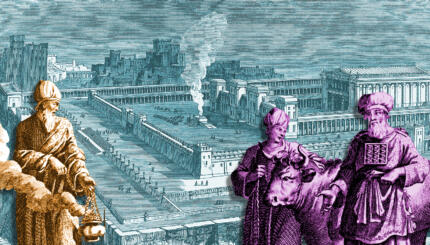The following article is reprinted with permission from The Jewish Religion: A Companion, published by Oxford University Press.
Orthodox Response
The reaction to Reform by Orthodox took two different forms. In the first, the Orthodox denied that the West had anything of real value to teach the Jews. Only in external matters of little ultimate consequence was the Jew obliged to confirm to Western mores. Spiritual needs could be catered for entirely adequately by the rich tradition Jews had inherited. The Hasidic movement, which arose in eastern Europe in the eighteenth century, went its own way, in any event, concerned solely with the joy of drawing nearer to God. The Mitnaggedim, the traditionalist opponents of Hasidism, also pursued their own path, establishing Yeshivot, schools of Talmudic learning, into which were introduced the ideals of highly individualistic, moralistic Musar movement with its stress on self-improvement as the goal of Jewish life.
Neo-Orthodoxy
A different response to Reform was that of neo-Orthodoxy, founded by Samson Raphael Hirsch of Frankfurt (1808-88). Hirsch advocated total loyalty to the Torah in its traditional formulation, but recognized that the Jew could gain much from than appreciation of the values of Western civilization. For neo-Orthodoxy, there was no need for the believing Jews either to opt out of Western culture, as the other traditionalists advocated, or to surrender any practices of the Torah, which, for neo-Orthodox were divinely ordained and hence immutable. The neo-Orthodox were to be found occupying positions in the highest echelons of Western society—as university professors, physicians, bankers, writers, musicians, scientists, and businessmen no different in dress and in many of their ideas from their Gentile friends and neighbors yet staunchly and proudly adhering to the Orthodox way of life in all its details.
The emergence of Nazism in Germany and the Holocaust which followed led many of the erstwhile followers of Hirsch to become thoroughly disillusioned with the master’s high regard for German culture. A significant number began to argue that Hirsch did not advocate neo-Orthodoxy as in any way an ideal but only as a means of halting the drift towards assimilation and Reform, in which, they claimed, it was in any event unsuccessful. Consequently, many of them preferred to embrace Hasidism or to enter the Yeshiva world with its basic indifference to the modern world and its values. The movement known as Modern Orthodoxy, however, in the USA, has an ideal not very different from that of Hirsch’s neo-Orthodoxy.
With your help, My Jewish Learning can provide endless opportunities for learning, connection and discovery.
The Conservative Movement as Middle Ground
A third religious movement, Conservative Judaism—particularly strong in the USA but with adherents in other parts of the world (in Israel and in England this form is known as the Masorti (“traditional”) movement)—seeks a balance between Orthodoxy and Reform, taking issue with Orthodoxy in its theory and with Reform in its practice. Conservative Judaism affirms the validity of traditional observances, accepting the authority of Halakhah, yet more open to change than Orthodoxy. Conservative Judaism maintains that historical investigation has exposed inadequacies in Orthodox theory. The Torah, on this view, has now to be seen not as a single entity revealed by God at one time in its entirety, but as the product of the historical experiences of the Jewish people over the ages in their loving quest for God. In the Conservative view, Jewish observances are binding on the Jew because they are the means by which he gives expression to his religious life. Divine inspiration is seen in a dynamic way; a human element is always present to understand and cooperate with the divine. On this view, God did not only give the Torah to Israel but through Israel. Accordingly, the devout Jew can allow himself to be completely open on the question of origins; this is a matter of scholarship, not of faith. But it is not origins which matter for religion. What matters is the development of ideas and institutions so as to serve the Jewish quest for God. For instance, the Conservative Jew is not disturbed by the suggestion that the dietary laws may have had their origin in primitive taboos, nor that the Sabbath may have originated in ancient Babylon. The fact is that the dietary laws and the Sabbath have become powerful vehicles for Jewish survival and for the holy living that is the aim of such survival.
Hasidic
Pronounced: khah-SID-ik, Origin: Hebrew, a stream within ultra-Orthodox Judaism that grew out of an 18th-century mystical revival movement.
Torah
Pronunced: TORE-uh, Origin: Hebrew, the Five Books of Moses.


